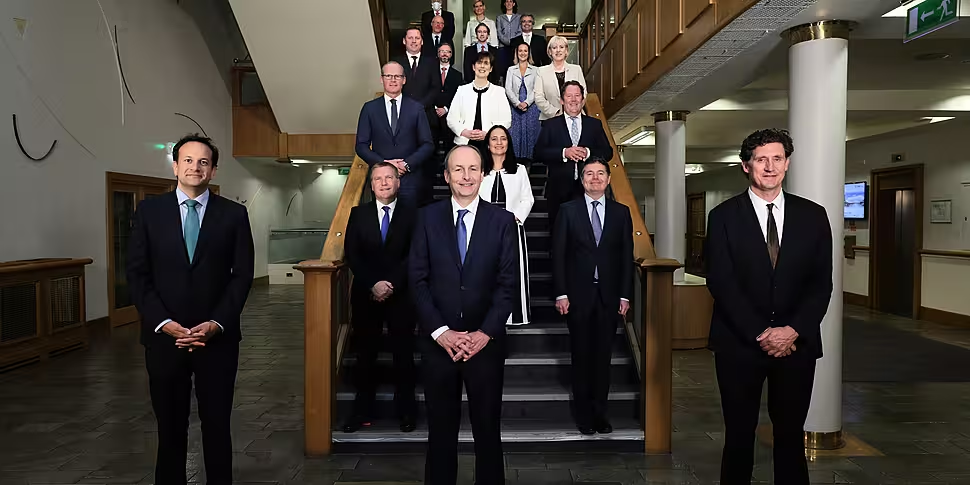There was a time in Ireland when a state of the nation address from a Taoiseach really meant it was time to panic.
You might reemember when Charlie Haughey looked down the camera and told us we were living way beyond our means.
There was Enda Kenny's solemn tone in advance of his first austerity budget in 2011.
Just six times did a Taoiseach take to the airwaves to address the nation at large between Jack Lynch's speech in 1969 and Enda Kenny's second broadcast to mark the end of the bailout programme in 2013.
Micheál Martin's team say he's done it 14 times in the past year.
Leo Varadkar wracked up his own impressive tally before handing over the Taoiseach's office this day last year, but nothing close to the once-a-month trips to the steps of Government Buildings we've become used to.
Martin's total will be closer to 20 by the time the chair rotates back to Varadkar in 18 months - and hopefully those upcoming speeches will bring better news.
A year on from the historic day in the Convention Centre when the last bonds of Civil War politics were thrown off it's worth taking a look at where the Government stands now.
A nightmare start
It was a nightmare first few months for the FF / FG / Greens Coalition - losing two Agriculture Ministers, an EU Commissioner and having a full-blown constitutional crisis with the Supreme Court in the wake of Golfgate.
That's not to mention the shambolic communications on key restrictions (everyone remember: be careful on trampolines).
It shouldn't be underestimated how important it is in a coalition government for the parties to meet and get to know each other.
COVID delayed that process massively, making it feel like one arm of government didn't know what the other was doing.
Things as simple as ministers sharing a private joke with a colleague at cabinet were impossible, with any in-person meetings done in the cavernous conference room in Dublin Castle where desks were well spaced out.
Those issues have settled down now. The TDs, advisors and civil servants all know who's who and have started to bed in to something resembling normality.
But politically this is a Government that hasn't felt the worst tensions of a working coalition yet.
The pandemic put everyone in Fianna Fáil, Fine Gael and the Greens on broadly the same page. There was a national crisis, everyone needed to muck in and help.
Dealing with the historical mess
Other issues won't bring the same unity, and there is a growing sense of Fianna Fáil ministers being left to pick up the historical mess from their Fine Gael colleagues.
Quite aside from COVID, Health Minister Stephen Donnelly now finds himself knee-deep in legacy issues like the National Maternity Hospital ownership row.
Meanwhile, Greystones' other cabinet member Simon Harris keeps his role as Minister Emeritus on all things Health, commenting from his new and politically quiet job in Higher Education.
It's all well and good for Leo Varadkar to say the extra €4 billion pumped into the Department of Health during COVID should be kept forevermore, when Minister for the Purse Strings Michael McGrath has to find the money.
That's not to mention the battle Darragh O'Brien faces when it comes to cleaning up the legacy of failed housing policies.
The other Fianna Fáil posts of Education and Agriculture are also difficult departments that won't have their respective ministers winning any popularity contests.
It seems Micheál Martin's frontbench were first in line on the day they were handing out poison chalices.
Fine Gael's challenges
That's not to downplay the challenges facing Fine Gael ministers, even though so far it's done them no harm in the opinion polls.
Heather Humphreys will have to successfully manage the unwinding of pandemic support payments.
Paschal Donohoe will be under similar pressure to his counterpart in Public Expenditure come budget time, and also has to deal with a rapidly changing global picture on corporation tax.
Leo Varadkar remains under the shadow of a garda investigation into his leaking of a GP contract a number of years ago.
So, while the last year might have felt overwhelming due to the sheer, head pounding dominance of COVID over our lives - year two could be even harder.
COVID has led to us all reassessing what's important to us and demanding something better than the lives we had before. That pressure will come to bear on all branches of government.
Elected Taoiseach in a time of crisis, Micheál Martin will have less than 18 months to govern in 'peace time' and stamp his legacy on the office.
For a man who first passed through the gates of Leinster House as a TD 32 years ago this month, time is suddenly against him.









